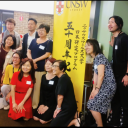第89回「指切りげんまん」って何?
What is Yubikiri Genman??
日本人には常識でも、文化の違うオージーにはイマイチ伝えづらい…。
そんな時にぴったりの表現や話の流れをご紹介。
(文:池田俊一 オーストラリア国立大学アジア・太平洋カレッジ日本センター 協力:池田澪奈)
エピソード
昨晩観ていた映画の中で、『指切りげんまんしよう』というセリフがあったけれど、これってどういう意味?
Aussie: One of the children said this phrase to another child in the movie ―but what does it mean?
You: Ah, this is a very old saying, with the full line being “指切りげんまん 嘘ついたら針千本飲ます 指切った” (yubikiri genman, uso tsuitara hari senbon nomasu, yubi kitta ). This roughly translates to ‘finger cutting and ten thousand fist-punches, if you lie you shall swallow one thousand needles, now the agreement has been made’.
Aussie: Wow, that is full-on !
You: It’s pretty violent and gory if you look at exactly what is being said. But quite often, when doing a pinky promise / pinky swear, Japanese children chant this particular tune. Not many know what they are actually saying, though !
Aussie: You’d hope so! But I guess it’s like that with Western nursery rhymes, too, such as ‘Three Blind Mice’ and ‘Ring A round the Rosy’. They seem happy and innocent sounding, but when you find out the hidden meanings, you realize that they were quite inappropriate for children.
You: Mmm, I agree.
Aussie: We actually have a similar phrase to 指切りげんまん, now that I think about it. The rhyme goes “cross my heart and hope to die, stick a needle in my eye”. This phrase is used when making a promise, too.
You: Oh, I’ve never heard of that one before.
Aussie: The needle even makes a recurring appearance, haha.
You: Hmm, both swallowing one thousand needles and sticking a needle into the eyeball sounds excruciating…
Aussie: Yes, just talking about it is giving me the goosebumps…
You: OK, let’s move on, haha.
説明する時のポイント
「指切りげんまん」というのは、誰かと約束をする時にお互いの小指を曲げて絡ませる時に口にする言葉で、対話文にもあるように「指切拳万、嘘ついたら針千本飲ます、指切った」という表現の最初の部分だと教えてあげよう。「指切」は、江戸時代の遊女が客と愛情を誓い合う(または騙す)時に自分の小指を第1関節から切ってわたすという風習(実際には、偽物を使ったらしいが)が由来の言葉で、「指切拳万」は、約束を破ったら小指を切って、拳で1万回殴るという罰を科すことを指している、と説明してあげよう。更に、罰として縫い針を千本飲まされることになるよ、という脅し文句を加え、固い約束を交わすうたい文句だと付け加えておこう。幼いころ、意味も分からず唱(とな)えていた子どもがほとんどだった、とも伝えてあげよう。
【単語・成句】
saying 格言/言い習わし
shall swallow 飲み込むことになる
full-on (怖いこと)だらけ
gory 血腥い/残虐な
pinky 小指(の愛称)
chant 唱える/うたう
tune 節(回し)
nursery rhymes 童謡/子守唄
innocent sounding 無邪気に聞こえる
hidden meanings 隠された意味
rhyme goes~ 歌詞はこんな風に~
recurring 何度も登場する
excruciating 激しい苦痛を与える
goosebumps 鳥肌
【会話文で使える表現】
“Let’s move on.”という表現は、文字通りは「次の段階に進もう」という意味だが、会話では「次の話題に移ろう」という意味で使われる。
【例1】“I’m fed up with those politicians’ scandals.” “ I agree. Let’s move on to brighter topics.”「あのような政治家の醜聞にはうんざりだ」「同感。もうちょっと明るい話題に移ろう」
【例2】“I think we have had enough discussions about this issue. Let’s move on to the next item.” “Fine, let’s do that.”「この問題については十分話し合ったので、次の議題に移ろう」「分かった。そうしよう」
【例3】“We have done enough research on his academic career.” “OK, let’s move onto his personal life.”「この人の学者としての経歴は十分研究した」「よし、では私生活の方に移ろう」











